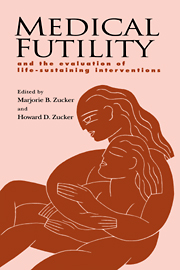Book contents
- Frontmatter
- Contents
- Preface
- Foreword
- Contributors
- 1 Medical futility: a useful concept?
- 2 Death with dignity?
- 3 Physicians and medical futility: experience in the critical care setting
- 4 Physicians and medical futility: experience in the setting of general medical care
- 5 Futility issues in pediatrics
- 6 Medical futility: a nursing home perspective
- 7 Alternative medicine and medical futility
- 8 How culture and religion affect attitudes toward medical futility
- 9 When religious beliefs and medical judgments conflict: civic polity and the social good
- 10 Conflict resolution: experience of consultation-liaison psychiatrists
- 11 Ethics committees and end-of-life decision making
- 12 The economics of futile interventions
- 13 Medical futility: a legal perspective
- 14 Professional and public community projects for developing medical futility guidelines
- 15 Community futility policies: the illusion of consensus?
- 16 Not quite the last word: scenarios and solutions
- Index of cited authors, cases, and statutes
- Subject index
5 - Futility issues in pediatrics
Published online by Cambridge University Press: 11 September 2009
- Frontmatter
- Contents
- Preface
- Foreword
- Contributors
- 1 Medical futility: a useful concept?
- 2 Death with dignity?
- 3 Physicians and medical futility: experience in the critical care setting
- 4 Physicians and medical futility: experience in the setting of general medical care
- 5 Futility issues in pediatrics
- 6 Medical futility: a nursing home perspective
- 7 Alternative medicine and medical futility
- 8 How culture and religion affect attitudes toward medical futility
- 9 When religious beliefs and medical judgments conflict: civic polity and the social good
- 10 Conflict resolution: experience of consultation-liaison psychiatrists
- 11 Ethics committees and end-of-life decision making
- 12 The economics of futile interventions
- 13 Medical futility: a legal perspective
- 14 Professional and public community projects for developing medical futility guidelines
- 15 Community futility policies: the illusion of consensus?
- 16 Not quite the last word: scenarios and solutions
- Index of cited authors, cases, and statutes
- Subject index
Summary
Many think that medical treatment for children is altogether different from that for adults. On the one hand, pediatrics seems to be about maintaining inherent good health through disease prevention, such as immunizations. On the other hand, we think of the obvious, even miraculous, advances in therapies for some childhood cancers (especially the most common, acute lymphocytic leukemia) and for disorders of the prematurely born. Unfortunately, pediatrics also has a less optimistic side. Some congenital anomalies, genetic disorders, and malignancies have not yet yielded to the press of modern medical science. Current technology and medical skill are unable to provide a reliably good outcome for very small preterm infants, certainly those born at 22 weeks of gestation or earlier, and a varying proportion of those born up to 26 weeks of gestation. The scourges of accidental injury, severe physical abuse, and AIDS continue to provide both enormous challenges and a depressing reminder of the limits of treatment.
Two features distinguish the futility confrontation in pediatrics faced by health care providers and the public from the confrontation in the rest of medicine. These are (1) our deeply held belief and hope that childhood should be different and that children should not die before some imaginary natural life span and (2) medical uncertainty in pediatrics, that is, the difficulty in predicting eventual outcomes, especially those pertaining to neurodevelopment. With these thoughts in mind, some issues in the debate over futile treatment in pediatrics are discussed.
- Type
- Chapter
- Information
- Medical FutilityAnd the Evaluation of Life-Sustaining Interventions, pp. 48 - 57Publisher: Cambridge University PressPrint publication year: 1997

